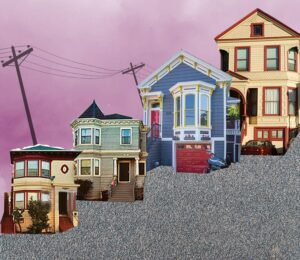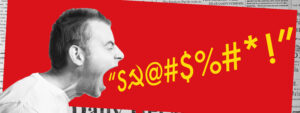
I joined Facebook during my freshman year of college. I’d heard a lot about it, of course, but had never really felt compelled to make that fateful click.
However, during winter break of that year, I went to do hurricane relief work in New Orleans with a student group from Mills. Once there, I made some friendly connections with students from Occidental College. At the end of the trip, everyone was asking me if I had a Facebook so they could keep in touch. I told everyone I didn’t, and their reaction was, “Why not? You should get one!”
Email seemed sufficient to me for staying in touch with friends—but because everyone kept suggesting I get one, I figured, why not? After all, Facebook claims that it “helps you connect and share with the people in your life”. How bad could that be? So I joined.I still remember the first few days on Facebook. I already felt its strange lure, it made me uneasy—suddenly, I could browse through newly acquired “Friends” photos, and see all their preferences and status updates, midnight escapades, drunken parties and best friend pics, plus the “likes” and “dislikes” of people I hardly knew.
The public nature of Facebook made everyone on it seem so self-conscious; many pictures felt overly posed, the smiles a little too strained, the hugs a tad too desperate, the red plastic cups of beer held too jauntily, displayed too prominently in party pictures. The comments on people’s walls often felt like the virtual equivalent of having a loud conversation with someone in a crowded room in the hopes of being overheard.
I remember some Facebook users, particularly girls, leaving comments about how other girls looked in pictures (“Wow, you look so pretty!!”), or worse, leaving disparaging remakes about themselves (“God I hate how I look in this picture! I have a double chin/ my nose is so big/ I look so fat!”) in the hopes of receiving comments from others assuring them that it was not so—comments which they would inevitably receive. It seemed that everyone was silently screaming, “Look at me! Aren’t I so awesome, so sexy, so cute, so witty, so fun, so…cool?”
In the movie The Social Network, actor Jesse Eisenberg (playing Facebook founder Mark Zuckerberg) kept repeating that the most important thing, even more important than making money, was that Facebook be “cool.” And who could have guessed that before Facebook, Zuckerberg’s big online project was designing a program to rate girls?!
As the weeks and months went by, the world of Facebook stopped feeling novel to me. I felt myself becoming sucked into it, taking its categories and standards for granted. I stopped thinking it was strange that the number of friends a person had was displayed on one’s profile, and, like everyone else, I would compare how many “Friends” I had in relation to others. I would sometimes spend hours mindlessly flipping through random people’s photos. Almost like the virtual equivalent of eating cheap candy or watching bad TV: a whole lot of nothing which, ultimately, left me feeling nauseous and slightly depressed.
My activities on Face-book made me feel insecure and bad about myself. I noticed I wasn’t the only one who was struggling, some people were facing much more serious situations; newspaper and magazine articles concerning harassment and hazing on Facebook were popping up everywhere.I had been saying I wanted to quit Facebook for over a year until last August when I finally pressed the “Deactivate Account.”
Just a few months later, I met my current boyfriend. During the time we were getting to know each other, he asked me for my Facebook information so he could send me some details about a movie we were planning on seeing. Relieved, I told him I wasn’t on Facebook anymore; I knew that if I had been I probably would have become just as obsessed with his profile as I had with been with all the others. Knowing all his interests and “favorites” too soon would’ve made the pleasure of gradually discovering them as we spent more time together impossible.
To this day, when we’re not talking in person (which, fortunately, is mostly how we communicate) we either call, e-mail, or send text messages, keeping the details of our relationship just between us—the way I like it.
Yes, Facebook is convenient, and yes, some parts of it I enjoyed. For example, I was able to easily stay in loose contact with my Chilean host sister, and others I had met during my experiences abroad. I was able to check in on people from elementary school whom I hadn’t seen in years, and marvel at the fact that we were now all adults.
Still, I am much happier off Facebook. Sure it’s not quite as easy to send a missile composed of a few short words to spontaneously catch up with someone. Communication takes a bit more effort, but I feel it makes the exchanges I do have that much more meaningful. Also, since leaving Facebook, I find I don’t waste as much time—although I still find my ways . . . The Office, anyone?
Life without Facebook feels good; no more accumulating friends as if they were shares of stock; no more wasting hours at a time numbly clicking through pictures and walls. After all, a wall is meant to keep some people in and others out. I suggest we tear down those walls and start TALKING to each other again. Who’s in?
Madeleine Anderson is a senior at Mills studying Spanish literature and in the process of completing the 4+1 Masters Education program in hopes of becoming an English teacher. When her face is not in a book, you can find her getting her dance on, schmoozing with friends, or lounging on Toyon meadow—often accompanied by her lovely sister Thea, a first-year.


